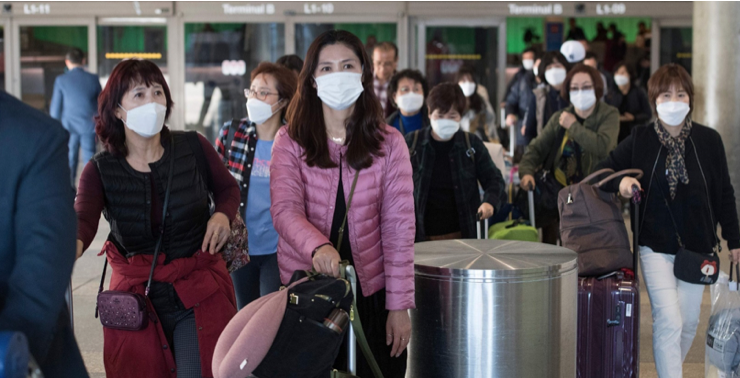CommentsLA WATCHDOG--The impact of the coronavirus on the City’s already precarious finances has yet to be determined, but there is little doubt that it will cause a materially change in the City’s budget for the fiscal year that begins on July 1, 2020.
This will create a wild scramble by the Mayor and the City Administrative Officer to “balance” the budget which is already in the red because of the budget busting labor agreements with the police and firefighters.
The shutdown of the City caused by the virus will have a negative impact on the seven economically sensitive General Fund revenues, especially the transient occupancy (hotel) tax that is projected to be about $330 million a year. But with hotels essentially vacant and rack rates in freefall, the hotel tax revenue will be less than 50% of the budgeted amount, resulting in a variance of more than $150 million a year. And this is the optimistic projection as occupancy levels are rumored to be in the range of 10%.
The sales and business taxes are budgeted to contribute almost $1.2 billion in revenue. But a 10-15% hit because of the virus is not an unreasonable assumption. This will cause a variance in the range of $150 million.
The other four economically sensitive taxes (the property tax, the utility users’ tax (primarily DWP), the documentary transfer tax on the sale of real estate, and the parking users’ tax) will be an estimated $100 million lower than the anticipated revenue.
Overall, annual revenues could be $400 million less than expected.
If so, then the City will have overcome a $600 million shortfall in the upcoming fiscal year: the existing $200 million deficit caused by the budget busting labor contracts with the police and firefighters and the $400 million impact from the virus.
No doubt that the Mayor, the City Council, and the City Administrative Officer are scheming on how to balance the budget.
“Solutions” may include calling for the State to cover some of the downside, tapping into the Reserve and Budget Stabilization Funds, renegotiating the new budget busing labor agreements, eliminating the hiring of new employees, furloughing employees, dumping employees on the three Proprietary Departments (DWP, Port, and LAX), requiring DWP to pony up additional cash over and above the annual transfer, instituting an Early Retirement Incentive Program that will cost the already underfunded pension plans hundreds of millions of dollars, reducing services, and calling for a tax increase. This is not dissimilar to actions taken during the Great Recession.
At the same time, despite record revenues, the City must also address this year’s $200 million deficit that will probably increase to over $300 million because of the impact of the coronavirus. This will also require various “solutions.”
While the dings caused by the virus are understandable and are, for the most part, beyond the control of the City, the budget deficit caused by the labor agreements with the police and firefighters are inexcusable and fiscally irresponsible, especially given that the City is experiencing record revenues, up almost $2 billion (over 43%) since Garcetti became our mayor.
The Mayor will submit his proposed budget to the City Council on or before April 20, at which time we will hopefully have a better idea of how the City intends to balance budget, both for the current year and for next year. But this process and the allocation of resources must be transparent and be accompanied by a commitment to Radical Transparency as recommended by the Neighborhood Council Budget Advocates.
***********************
Radical Transparency includes:
- Update the Four-Year Budget Outlook to reflect the current budget reality, including the projected deficits.
- Require the Mayor to submit the budget to the City Council on or before February 1 rather than the current deadline of April 20. Each Department will then present its proposed budget and priorities to the appropriate City Council Committee. Afterwards, the Budget and Finance Committee will conduct hearings on each Department’s budget.
- All labor negotiations shall be open and transparent. Furthermore, the City shall solicit an independent opinion that analyzes the fiscal impact of any new labor contracts. Beginning 30 days after the release of the independent opinion and prior to approval, the City Council will conduct a series of public meetings to discuss the new labor contracts. Any new labor agreements shall not result in deficits.
- Create a Pension Commission to review and analyze the City’s pension and Other Post-retirement Employment Benefit (OPEB) plans and develop recommendations to eliminate the unfunded liability over time. [Recommended by the LA 2020 Committee]
- Implement multiyear budgeting. [Recommended by the LA 2020 Committee]
- Develop a ten-year infrastructure plan that includes, but is not limited to, streets, sidewalks, parks and their restrooms, trees, buildings, and vehicles. This will include plans for the Los Angeles River, the Civic Center, and the Convention Center.
- Benchmark the efficiency of the City’s Departments and operations.
- Implement a plan to increase the City’s Reserve and Budget Stabilization Funds to an amount equal to 10% of its General Fund Revenues.
- Establish an independent Office of Transparency and Accountability to oversee the budget and other related matters in real time. [Recommended by the LA 2020 Committee]
- Develop solutions to balance the budget over the next four years and eliminate the Structural Deficit.
(Jack Humphreville writes LA Watchdog for CityWatch. He is the President of the DWP Advocacy Committee and is the Budget and DWP representative for the Greater Wilshire Neighborhood Council. He is a Neighborhood Council Budget Advocate. He can be reached at: [email protected].)
-cw
















